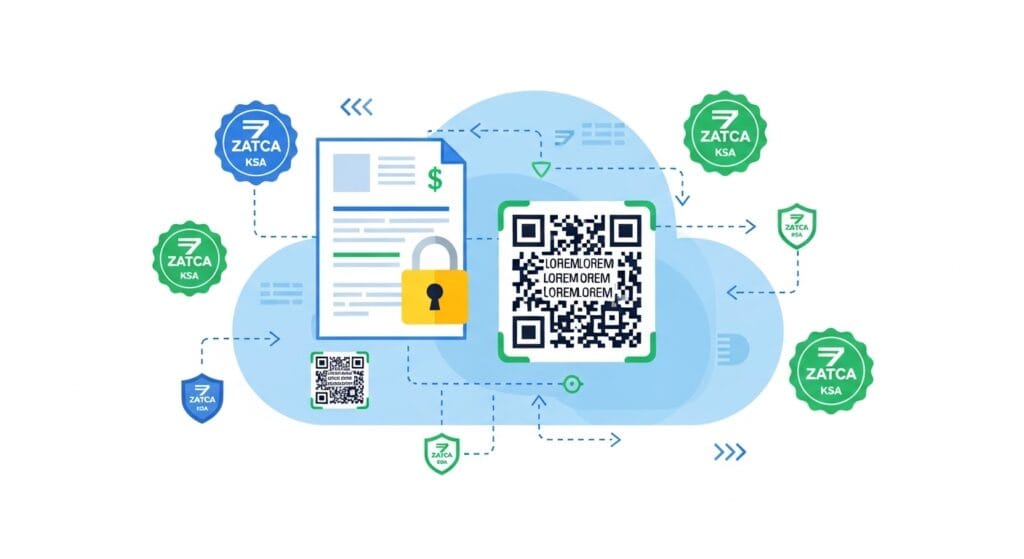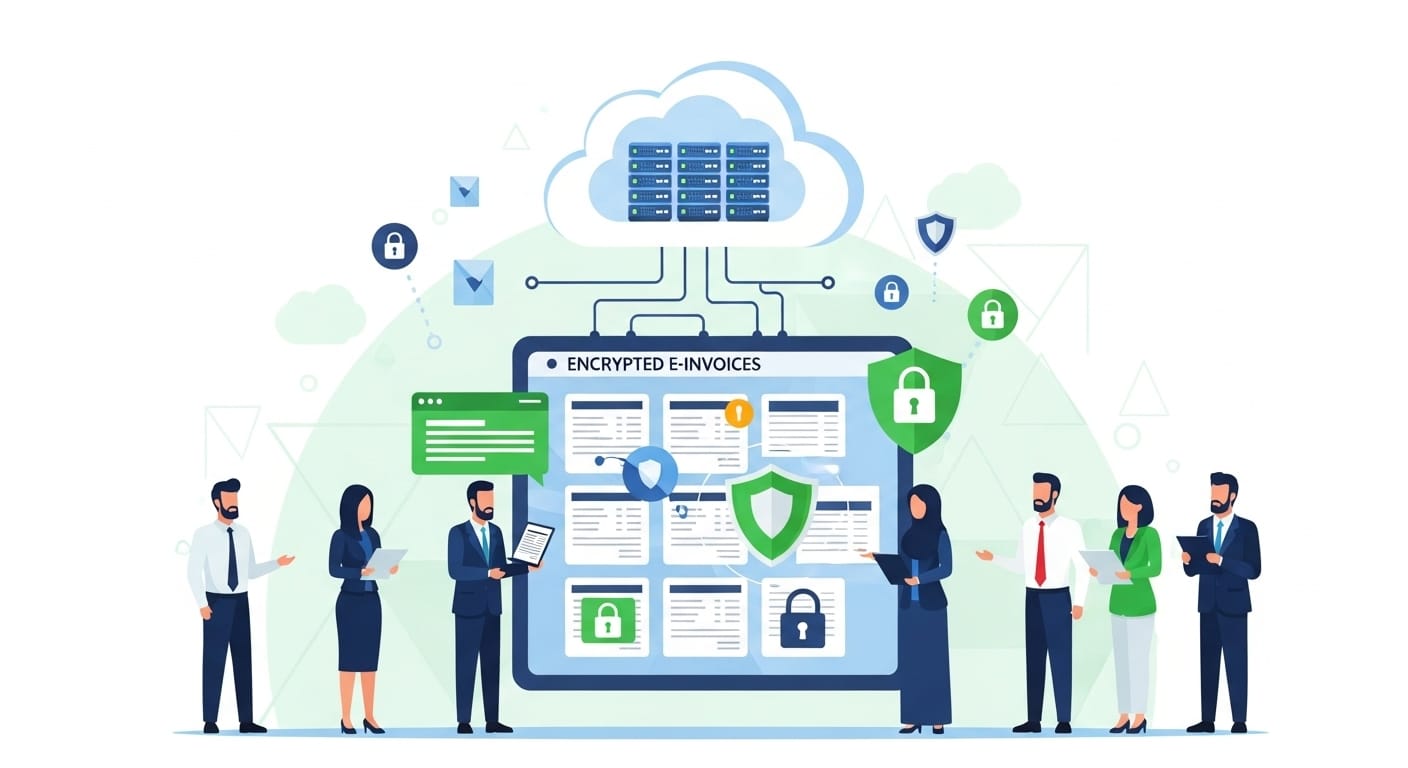As Saudi Arabia’s businesses undergo a rapid digital transformation, the Zakat, Tax and Customs Authority (ZATCA) e-invoicing (Fatoora) system stands as a cornerstone of this new, digital-first economy. The rollout of Phase 2 (the Integration Phase) is compelling businesses to move beyond simple compliance and integrate their core financial systems directly with ZATCA’s platform.
This integration, however, opens a critical new conversation. While most businesses are rightly focused on compliance—”Does my system meet ZATCA’s rules?”—many are overlooking an equally vital, long-term question: “Is my data secure?“
When you choose an e-invoicing solution, you are not just buying a piece of software. You are entrusting a partner with the most sensitive data your company possesses: your complete sales ledger, your pricing, your customer list, and your core financial records.
In this new landscape, choosing from the many e-invoicing solution providers in Saudi Arabia becomes a decision that is as much about security and data privacy as it is about compliance. This article will guide you through the essential security considerations and provide a checklist for what to demand from your provider.
Why E-invoicing Security is Non-Negotiable
An e-invoice is not just a digital version of a paper receipt. It is a structured data file (XML) containing the DNA of your business transactions. The stakes for protecting this data are enormous:
- Financial Data Exposure: In the hands of a competitor, your complete pricing structure, discount levels, and sales volumes would be a catastrophic leak.
- Customer Confidentiality: Your customer database is one of your most valuable assets. A breach not only damages your reputation but could also violate data privacy regulations.
- Operational Disruption: What if a ransomware attack locks your invoicing system? If you cannot issue ZATCA-compliant invoices, your business operations grind to a halt. You cannot legally make a sale.
- Legal & Reputational Damage: The cost of a data breach isn’t just the ZATCA-related penalty. It’s the loss of customer trust, which can take years to rebuild, and potential legal action from affected parties.
Your data’s security is only as strong as the weakest link, and that weak link is often the third-party provider you choose.
ZATCA’s Built-in Security: The Foundation
The good news is that ZATCA designed the Fatoora system with a robust security foundation. Your provider isn’t starting from scratch; they must adhere to a strict set of protocols.
Here are the core security features mandated by ZATCA itself:
- Cryptographic Stamp (Hashing): This is the “digital fingerprint” of your invoice. The system generates a unique hash (a long string of characters) from the invoice data. If even one riyal, one letter, or one-pixel changes, that hash changes completely. This ensures Data Integrity—it’s a mathematical guarantee that the invoice has not been tampered with since it was cleared.
- Universally Unique Identifier (UUID): Every invoice is assigned a unique 128-bit number. This prevents invoice duplication, fraud, and ensures every single transaction is traceable within the ZATCA ecosystem.
- Secure API Integration (Phase 2): In the integration phase, your system “talks” to ZATCA’s Fatoora platform. This communication is not sent over a simple email; it happens through a secure, encrypted “digital tunnel” known as an API (Application Programming Interface). This ensures your data is protected from eavesdropping while it travels.
- Tamper-Proof Storage: Solution providers are mandated to have mechanisms that prevent the alteration or deletion of invoices after they have been issued.
This framework ensures the integrity of the invoice and the security of its transmission to ZATCA. But what about the security of your data while it’s sitting on your provider’s server?
That is the provider’s responsibility.
7 Security Questions You MUST Ask Your E-invoicing Provider
ZATCA secures the pipeline to their platform. Your provider must secure the platform itself. Before you sign any contract, demand clear, specific answers to these questions:
- “Are you an officially ZATCA-Approved Solution Provider?”This is the first and most important question. If the provider is not on ZATCA’s official list, walk away. This approval confirms that ZATCA has, at a minimum, vetted their solution for compliance and basic technical requirements.
- “How is my data encrypted?”This is a two-part question.
- Encryption in Transit: Is all communication between you and their platform secured with SSL/TLS (the “httpspadlock” in your browser)? This is a basic standard.
- Encryption at Rest: This is the critical one. When your data is just sitting on their server, is it encrypted? If a hacker bypassed their firewall and stole the physical hard drive, would they see your raw financial data or just unreadable gibberish? Demand “encryption at rest.”
- “What is your cloud infrastructure and where is my data hosted?”Not all cloud platforms are equal.
- Infrastructure: Is the provider using a world-class, secure cloud platform like Amazon Web Services (AWS), Microsoft Azure, or Google Cloud? Or are they running it on a single, private server in their office closet? Enterprise-grade clouds have billions of dollars invested in security.
- Data Sovereignty: For compliance and performance, is your data hosted inside Saudi Arabia?
- “What are your Access Control and User Permission policies?”Not everyone in your company should have “admin” rights.
- Can you implement Role-Based Access Control (RBAC)? Can your sales team create invoices, but only your finance manager approve them?
- Does the platform support Two-Factor Authentication (2FA) to prevent unauthorized logins even if a password is stolen?
- “What is your Backup and Disaster Recovery (DR) plan?”What happens if their main server fails or is hit by a natural disaster?
- How often is your data backed up (e..g, daily, hourly)?
- Are the backups stored in a separate, secure (geo-redundant) location?
- What is the Recovery Time Objective (RTO)—how long would it take to get your system back online? If they can’t answer this, they don’t have a real plan.
- “Is your solution an integrated part of an ERP or a standalone ‘patch’?”A standalone tool that just “generates ZATCA invoices” creates a new, separate silo of your financial data, doubling your security risk. The most secure solution is one where e-invoicing is a native function of your core accounting or ERP system. This means your data never leaves its secure, central home.
- “Can you provide a copy of your security certifications (e.g., ISO 27001)?”While not always mandatory, this separates the serious providers from the rest. An ISO 27001 certification is the international gold standard for information security management, proving the provider has been independently audited and adheres to strict security processes.
Cloud vs. On-Premise: A Modern Security Comparison
Many businesses traditionally believe that an on-premise server (in their office) is more secure. In the modern era of ZATCA compliance, this is often a dangerous misconception.
| Security Aspect | On-Premise Solution | Secure Cloud Provider (like Daysum) |
| ZATCA Updates | Your IT Team’s Responsibility. Must manually update APIs and security patches from ZATCA. Slow and high-risk. | Provider’s Responsibility. Patches and updates are rolled out instantly and automatically to all users. |
| Physical Security | Your server room. Vulnerable to theft, fire, or flood. | Enterprise-grade data centers with 24/7 security, biometric access, and redundant power. |
| Cybersecurity | Relies on your local firewall and IT team, who are generalists. | Managed by a dedicated team of cybersecurity specialists using advanced threat detection. |
| Backups & Recovery | Your responsibility. Often manual, infrequent, and stored in the same building. | Automated & Geo-Redundant. Backed up daily to multiple secure locations. |
| Total Cost of Security | Extremely high. Includes hardware, IT salaries, and software licenses. | Included in your subscription. You get enterprise-grade security for a fraction of the cost. |

The verdict: For over 99% of businesses, a reputable, ZATCA-approved cloud provider offers vastly superior security and reliability than an on-premise solution.
Daysum: Security & Compliance at the Core of Your ERP
Choosing from the list of e-invoicing solution providers in Saudi Arabia is a critical decision. At Daysum, security isn’t an add-on; it’s the foundation of our Odoo ERP solution.
We don’t just “bolt on” a ZATCA module. Our e-invoicing solution is a native, core function of your integrated accounting, sales, and inventory system.
The Daysum Security Guarantee:
- ZATCA-Approved Provider: We are an officially approved solution provider, guaranteeing our system meets all technical and security requirements.
- Integrated Odoo ERP Platform: Your financial data stays in one secure, unified database. There are no risky data silos or manual syncs.
- Enterprise-Grade Cloud: We host on world-class, highly secure cloud infrastructure, ensuring 99.9% uptime and physical security.
- End-to-End Encryption: Your data is protected with SSL encryption in transit and robust encryption at rest.
- Granular Odoo Controls: We implement Odoo’s powerful Role-Based Access Control, giving you complete command over who can see and do what within your system.
- Automated Backups & Updates: We manage all ZATCA updates and backups, so you are always compliant and your data is always safe.
- Local KSA Support: Our team is based in the Kingdom, providing expert support that understands both Odoo and ZATCA’s requirements.
Frequently Asked Questions (FAQs)
Q1: Is my data shared with ZATCA secure?
Yes. The connection between your provider’s system and ZATCA’s Fatoora platform is a highly secure and encrypted API. This “digital tunnel” is designed to protect data in transit.
Q2: Can ZATCA see all my business secrets, like my costs or employee salaries?
No. ZATCA only requires the data points listed in the e-invoicing regulation, which are related to the invoice itself (seller, buyer, items, quantities, price, tax). They do not have access to your internal costs, payroll, HR records, or other private data within your ERP.
Q3: What’s the biggest security mistake a business can make with e-invoicing?
Choosing an unapproved provider or using a simple, standalone invoicing tool that isn’t part of a secure, integrated system. This creates data silos, increases the risk of a breach, and often leads to manual data entry errors.
Conclusion: Choose a Partner, Not Just a Provider
Your e-invoicing system is the new digital heart of your business’s finances. The security of this system is paramount. Don’t choose a provider based on price alone. Scrutinize their security, their infrastructure, their backup plans, and their commitment to data privacy.
Choose a long-term partner who sees security not as a checkbox, but as a core responsibility.
Don’t leave your most critical financial data at risk. Contact Daysum today for a free, confidential consultation. We’ll assess your current compliance and show you what a truly secure, integrated, and ZATCA-approved ERP solution looks like.



